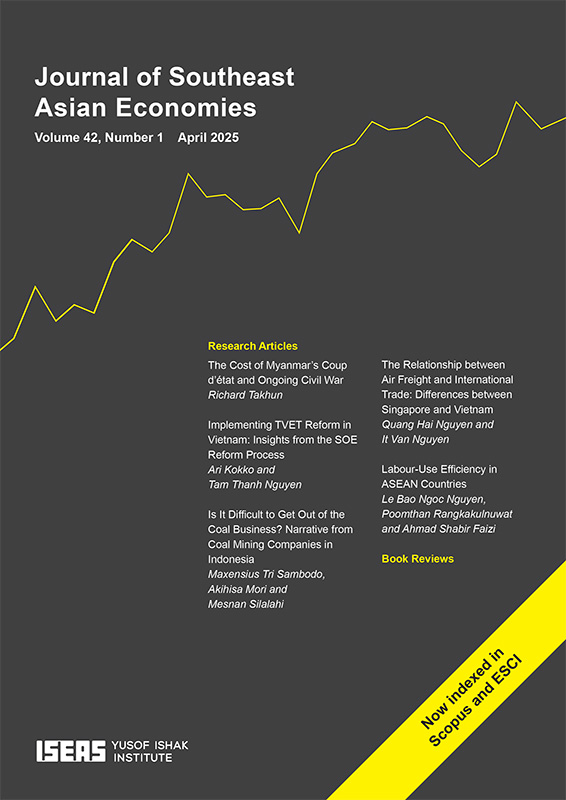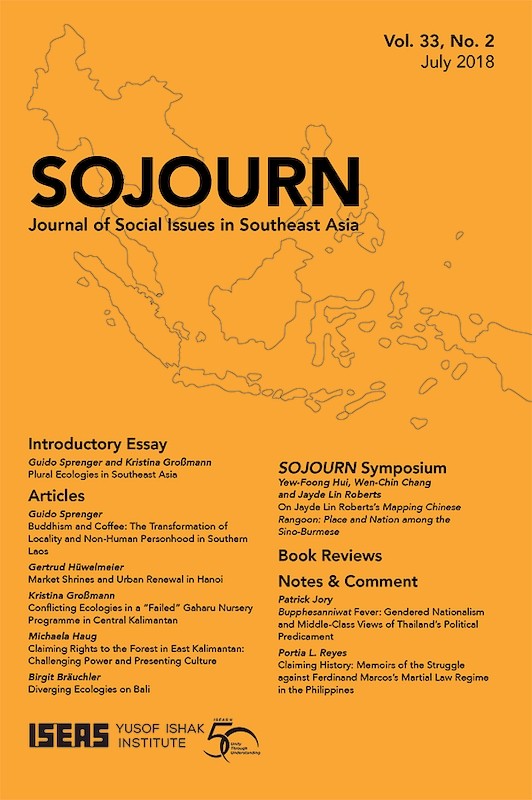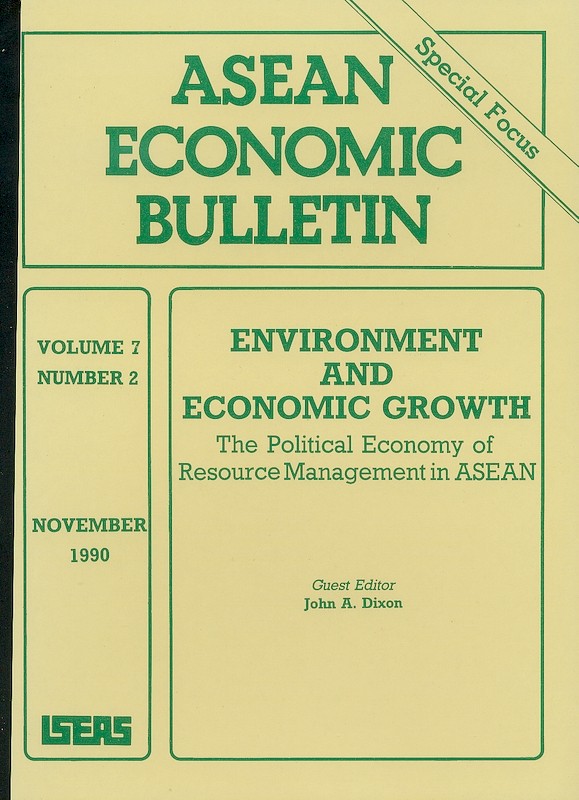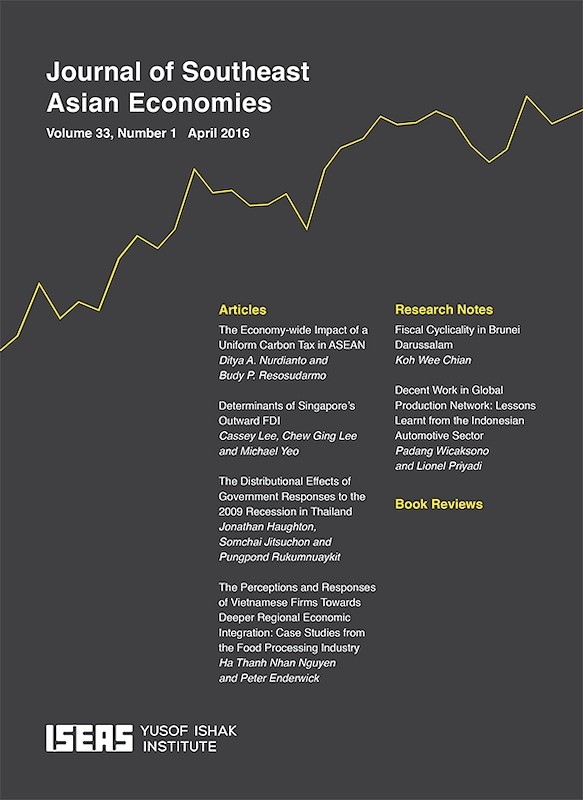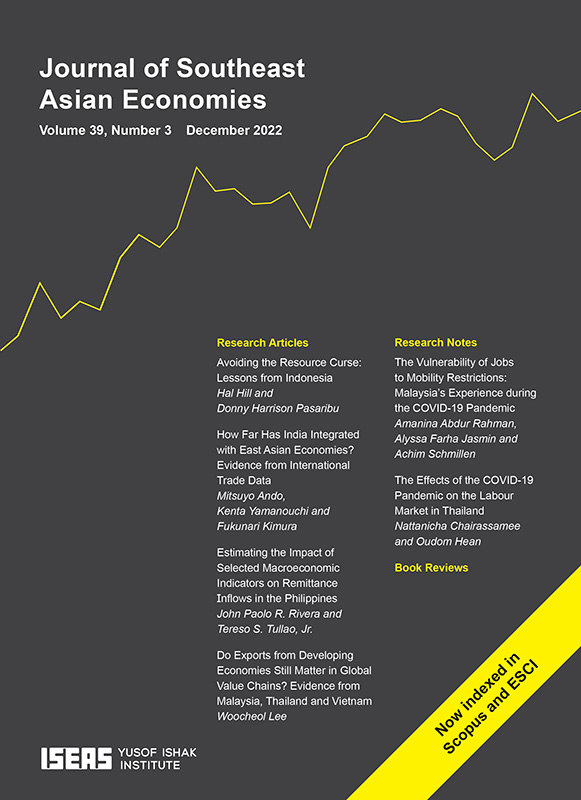ASEAN Economic Bulletin Vol. 25/1 (Apr 2008). Special Focus on The Environment, Climate Change, and Natural Resources in Southeast Asia: Issues and Challenges
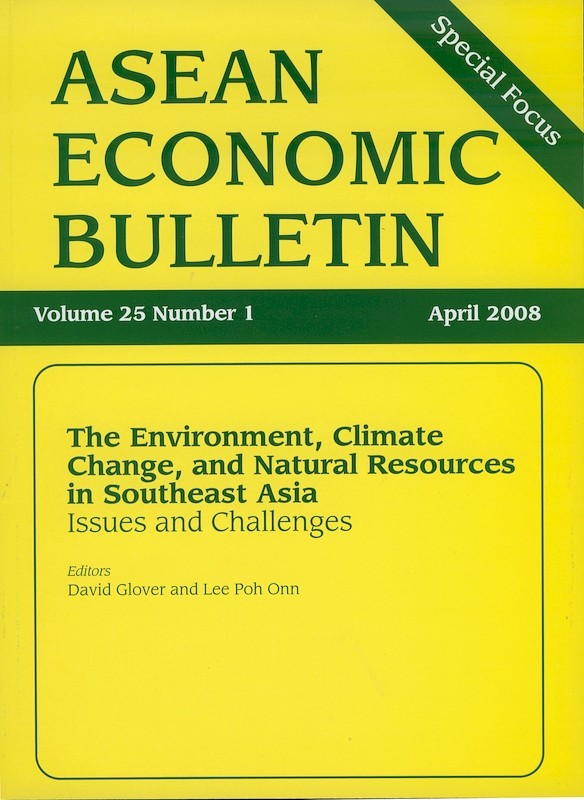
Date of publication:
April 2008
Number of pages:
112
Code:
AE25/1
Contents
-
ASEAN Economic Bulletin Vol. 25/1 (Apr 2008). Special Focus on The Environment, Climate Change, and Natural Resources in Southeast Asia: Issues and Challenges
[Whole Publication] -
Preliminary pages
- ARTICLES
-
The Environment, Climate Change, and Natural Resources in Southeast Asia: Issues and Challenges, by David Glover, Lee Poh Onn, authors
-
Adaptation to Climate Change: Needs and Opportunities in Southeast Asia, by Herminia A Francisco, author see abstractThis paper focuses on the adaptation strategies of developing countries and the possible adaptation options available for Southeast Asia. Adaptation refers to the actions taken by individuals, communities, or governments in response to climate change, to reduce the adverse impacts or to take advantage of opportunities offered by such changes. Adaptation strategies have hardly been considered by many Southeast Asian countries in as recently as two or three years ago. The cost of adaptation and the funding available is also discussed, with the possibility of using institutions for risk sharing (disaster management) and risk transfer (insurance and derivatives) as measures to adapt. A regional outlook for adaptation for Southeast Asia concludes the paper.
-
Tariff Reductions, Carbon Emissions, and Poverty: An Economy-wide Assessment of the Philippines, by Erwin L Corong, author see abstractThis study investigates the potential impact of a carbon tax on the economy of the Philippines and on the livelihood of its people. It focuses on the interaction between such a tax and the country's ongoing trade liberalization programme. With energy use on the rise in the Philippines, increases in greenhouse gas emissions are almost inevitable. The policy most widely recommended by economists a carbon tax may be an efficient way to deal with the problem, but there is concern about its distributional effects. The study finds that a carbon tax would compensate for any tariff revenues lost through a reduction in trade tariffs. It also finds that the tax would reduce poverty and increase peoples welfare. Imposing a carbon tax during the ongoing trade liberalization process provided the carbon tax is used to reduce income taxes is a sensible approach that could meet the country's economic, environmental and equity objectives.
-
Mitigating Distributional Impact of Fuel Pricing Reform: The Indonesian Experience, by Arief Anshory Yusuf, Budy Resosudarmo, authors see abstractIn 2005, the Indonesian government implemented a massive fuel price increase. While the benefits of the reform on efficiency grounds have been widely acknowledged, there is still debate about whether the reform was equitable. That question is answered in this paper using a Computable General Equilibrium (CGE) model with disaggregated households that allows for a rich and accurate distributional story. Analysis of various counter-factual scenarios analysis of the reform is carried out. It suggests that the reform could have been progressive if it increased only vehicle fuel prices. However, it tends to increase inequality especially in urban areas when the price of domestic fuel (kerosene) is also increased. Proper and effective compensation is important in mitigating the distributional cost or poverty impact of the reform. A uniform cash transfer to poor households that disregards poor households' heterogeneity tends to over-compensate the rural poor but under-compensate the urban poor.
-
Payments for Environmental Services in Vietnam: An Empirical Experiment in Sustainable Forest Management, by Bui Dung The, Hong Bich Ngoc, authors see abstractThis paper assesses the potential for the payments for environmental services (PES) conservation approach in Vietnam. This was done by conducting an experimental PES scheme involving sustainable forest management. The work was constrained by the fact that all land in Vietnam is state-owned and that there has been limited PES market development in the country. However, the results of the experiment (in forest areas where the fundamental conditions for PES were met) were quite promising. Participation in the trial scheme was good, despite the fact that it was an experiment of limited duration. Moreover, institutional support was already available and effective. Expected environmental impacts were also observed: the sustainable forest management regime that was tied to the PES scheme resulted in a reduction in both soil erosion and in destructive natural forest extraction activities. In light of these findings, it is suggested that more practical policy/programme trials should be implemented. These will allow Vietnamese policy-makers to gain more experience and knowledge before the large-scale implementation of PES is tried in the country.
-
Mobilizing Resources for Marine Turtle Conservation in Asia: A Cross-country Perspective, by Orapan Nabangchang, Jin Jianjun, Anabeth Indab, Truong Dang Thuy, Dieldre S. Harder, Rodelio F Subade, authors see abstractThis article reports the results of a comparative study conducted in China, the Philippines, Thailand and Vietnam to assess households willingness to pay for marine turtle conservation and the potential to mobilize funds. Results show that imposing even a modest mandatory surcharge on residential electricity bills would not pass a referendum. This suggests that many people place a low priority on marine turtle conservation compared to other public policy issues. Nevertheless, there is some potential for voluntary contributions, though mobilizing these also presents problems. Until Asia develops higher per capita incomes and trustworthy payment vehicles, the international community will need to play an important role in financing conservation in the region.
-
Ecological Solid Waste Management in Suburban Municipalities: User Fees in Tuba, Philippines, by Antonia Corinthia C Naz, Mario Tuscan N Naz, authors see abstractUsing a participatory approach, this study looks at how a local government in the Philippines might organize and finance solid waste management to meet strict new national targets. Using a "choice modelling" approach, the researchers were able to see how people and companies value the attributes of various waste management services and how much they would be willing to pay for them. The attributes included frequency of waste collection and the methods used to take away the garbage. Based on survey results and an analysis of waste management costs, the study recommends the option with the lowest maintenance and operating costs and the highest cost recovery levels: once a week collection of residual waste by municipal workers with a garbage truck. Even with this option, however, user fees could only partially finance the costs of this service. Achieving the new national standards at even a minimum level would leave a suburban municipality with a "funding gap" of 2 million Philippine peso per year between costs and expected revenue from user fees.
-
The Impacts of Coal Mining on the Economy and Environment of South Kalimantan Province, Indonesia, by luthfi Fatah, author see abstractThe purpose of this research is to analyse the impact of the coal mining industry on the economy as well as the environment of South Kalimantan Province, Indonesia. The South Kalimantan Province is an area with abundant deposits of coal and contributes 16.36 per cent to the national coal stock. Coal mining is a profitable business. It creates employment, generates value, and improves the foreign investment of a country or region. However, coal mining has its disadvantages including negative externalities. It seems that in this business the public gets the dust and dirt, while the workers and managers get the benefits and advantages. This research uses a Social Accounting Matrix (SAM) to analyse the impact of the coal mining industry on the economy and to do simulations to find alternative policies on the coal industry that are suitable for economic improvement and environmental sustainability. The results show that the coal mining industry in South Kalimantan Province is growing. Large-scale coal mining is more profitable economically than small-scale operations, but in terms of environmental impact, the latter is a better choice as it exploits less resources. The policy-maker needs to consider measures to reduce the level of coal exploitation to save the environment and investment policies that support agricultural-based activities where the employment rate is the highest. The first easy step is to impose taxes on coal mining to slow down mining activities and then use this tax revenue as transfer payments such as subsidies and direct transfers in kind (for example, rice and farming equipment) to support the needs of lower income households in the province.
-
Costs and Benefits of Flue Gas Desulfurization for Pollution Control at the Mae Moh Power Plant, Thailand, by Varaporn Punyawadee, Ratana Ponthisuwan, Numpet Winichaikule, Kanitta Satienperakul, authors see abstractThis study provides a cost-benefit analysis of the flue gas desulfurization (FGD) systems installed at the Mae Moh power station in northern Thailand. A "before and after" study focused on the impact this air pollution clean-up technology had on human health in the area surrounding the power plant. Impacts on local agricultural and forest productivity are also assessed. The set-up and operational costs of the plant, along with other key costs, are compared with the economic value of all the benefits that the FGD systems will bring over their twenty-five year lifespan. The study finds that this clean-up technology has not been cost effective at this site - in other words it is an economic burden, rather than benefit, to society. While the study acknowledges that the pollution clean-up has had many positive benefits, it argues that cheaper options could have been considered.

